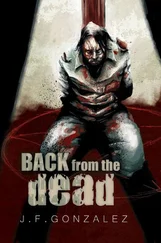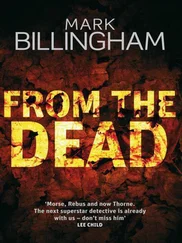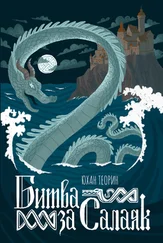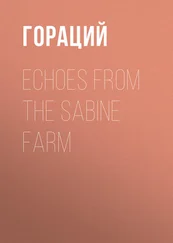“Hello?”
No one replied. The light was off and the hallway was dark. She listened for the sounds of heavy footsteps and a cane tapping along the floor, but there was only silence.
He’s not at home — go and see Gerlof, urged her inner voice. But she was too curious. Didn’t people on Öland lock their doors when they went out? Did they still trust each other so much?
WELCOME, it said on a green plastic mat by the door. Julia wiped her feet a couple of times and walked in.
“Hello?” she said. “Ernst? It’s Julia. Gerlof’s daughter...”
From the ceiling in the hallway hung a mobile of small wooden ships, sailing around in the draft. To the right lay a kitchen; it was clean and tidy, with a small table and two wooden chairs. To the left was a bedroom with a narrow bed, which was made.
The hallway led into a living room with a sofa, a television, and a big picture window overlooking the quarry and the blue sound beyond. There were piles of newspapers and books on the table, but the living room was empty too. On one wall was a hexagonal clock made of polished limestone, with the hands made of slate.
The only remarkable thing about the house was the fact that the clock appeared to be the only thing made of stone. Did Ernst get enough of it when he was outdoors?
She moved back into the hallway and looked around a couple of times, as if some unknown attacker might leap out of a crack in the walls. She went back outside and closed the door carefully.
Julia stood there motionless in the sunshine, unsure of what to do next. Ernst Adolfsson was bound to be around somewhere out here: he had merely forgotten to lock his door.
She looked over toward the stone sculptures on the quarry’s edge. Beside them was a small shed painted red and surrounded by birch trees; in a pile outside the shed lay several blocks of stone and rocks of different sizes. Some bore the signs of having been worked on, but looked incomplete. Some resembled misshapen human beings, Julia thought. She could see deformed faces and black eye sockets in the stone, and it made her think of trolls who stole away human children and took them inside the mountain forever. Gerlof had told her that when the quarry workers’ tools went missing in times gone by, they always blamed the troll. It was unthinkable that any of their fellow workers might have stolen them.
She tore her gaze away from the stones and again looked over toward the completed, polished works of art by the sheer cliff edge above the quarry. Small lighthouses, round well lids, tall sundials, and a couple of broad gravestones. The nameplates on the gravestones were still empty.
Something was missing. There was a wide space in the long row of sculptures, and Julia moved closer. She had seen something from the other side of the quarry the previous evening: the tall church tower that resembled the one up in Marnäs was gone. A small shallow depression gaped in the gravel by the cliff edge above the quarry.
Julia slowly walked forward between the polished stones, and the quarry opened up in front of her like an enormous empty pool.
The quarry wasn’t deep here, just a few yards, but the drop was sheer. She stood by the edge, looking silently out across the barren, stony landscape, and suddenly caught sight of the tall church tower immediately below her. It had fallen from the edge, straight down into the quarry, and landed on its side. The top of the tower was pointing westward, toward the water.
The church tower hadn’t smashed to pieces.
But beneath the oblong stone sculpture, Ernst Adolfsson lay outstretched. He was staring up at the sky from the bottom of the quarry, his mouth bleeding and his body shattered.
Everything has changed. Big things are going to happen, both out in the world and in Nils Kant’s life. He can feel it in the wind.
The sun above the alvar is stronger than ever, the Öland winds are fresher, the air clearer, and the flowers are in full bloom. The grass is green, not yet burned by the sun of high summer. Vague, flickering little marks in the sky grow into swallows, swooping down like black arrows over the flat ground for a few moments, then gathering speed as they soar upward again, and suddenly there they are, high in the sky once more.
Spring has come to Öland with a vengeance, and Nils Kant can sense changes in the air. He is almost twenty years old now, finally grown up and completely free. Life lies ahead of him, and big things are going to happen. He can feel it in the whole of his body.
Nils is getting too old to be wandering around out here in the silence, hunting hares. He has other plans. He’s going to go off out into the world when the war is over, anywhere he wants to. He would like to take Maja Nyman with him, the girl who lives in a cottage down by the ridge in Stenvik. He remembers what she looks like, and thinks of her quite often. But they have never really spoken, just said hello when they’ve met, if nobody else was with her. If he doesn’t get the opportunity to talk to her properly soon, he’ll travel alone.
On this particular day he is further away from Stenvik than usual, almost over on the eastern side of the island. Before he crossed the main road he shot two hares; he’s left them under some bushes so that he can pick them up on the way home. He’s intending to shoot one or two more before he goes home to his mother, and perhaps a few swallows on the way back, just for fun.
The water from the melted snows of winter is still lying in big pools all over the alvar; it’s a bit like walking in a boggy landscape, full of small lakes. The water is drying up quickly in the sun. Nils is wearing big, sturdy boots, and can wade straight through if he wants to. He is completely free and he owns the whole world.
Adolf Hitler tried to own the world. He’s dead now; he shot himself in Berlin a week or so ago. That was the end for Germany. Nobody there had the will or the strength to fight the Russians and the Americans any longer.
Nils splashes up out of a pool of water and pushes through a clump of juniper bushes. He remembers that he liked Hitler when he was younger; he had great respect for Hitler’s strength of will, at any rate.
He used to listen reverently to fragments of Hitler’s thundering speeches from Germany when his mother had the radio on in the living room, and for several years he waited for the German bombers to sweep in across Öland, for the war to come at last, but now Hitler is gone and the might of Germany has been smashed to pieces by the English bombers.
Germany doesn’t seem particularly interesting any longer. England, on the other hand, is tempting. And America seems huge and full of promise, but too many people from Öland have already gone there and never returned; thousands disappeared without a trace in the nineteenth century. Nils wants to travel the world and then return to Stenvik like an emperor.
Nils hears something, a low but solid sound, and he stops.
There is no sign of a hare, and yet Nils feels as if...
He isn’t alone.
Someone is there.
He has heard something in the wind, a brief sound which is neither birdsong nor the humming of insects nor the neighing of horses. He has been walking around on the alvar for years; he knows when things are as they should be, and when they are not. Right now there’s something that definitely isn’t right. He can feel prickles of unease running down the back of his neck and his spine.
This is no hare, this is something else.
Wolves? Nils’s grandmother, long dead now, used to tell stories about wolves on the alvar. There used to be wolves there. But not now.
People?
Somebody creeping up on him?
Nils slowly unhooks the Husqvarna shotgun from his shoulder, raises it in both hands, ready to shoot, and releases the safety catch with his thumb. Two cartridges from Gyttorp cartridge factory are ready to fly down the barrel.
Читать дальше












